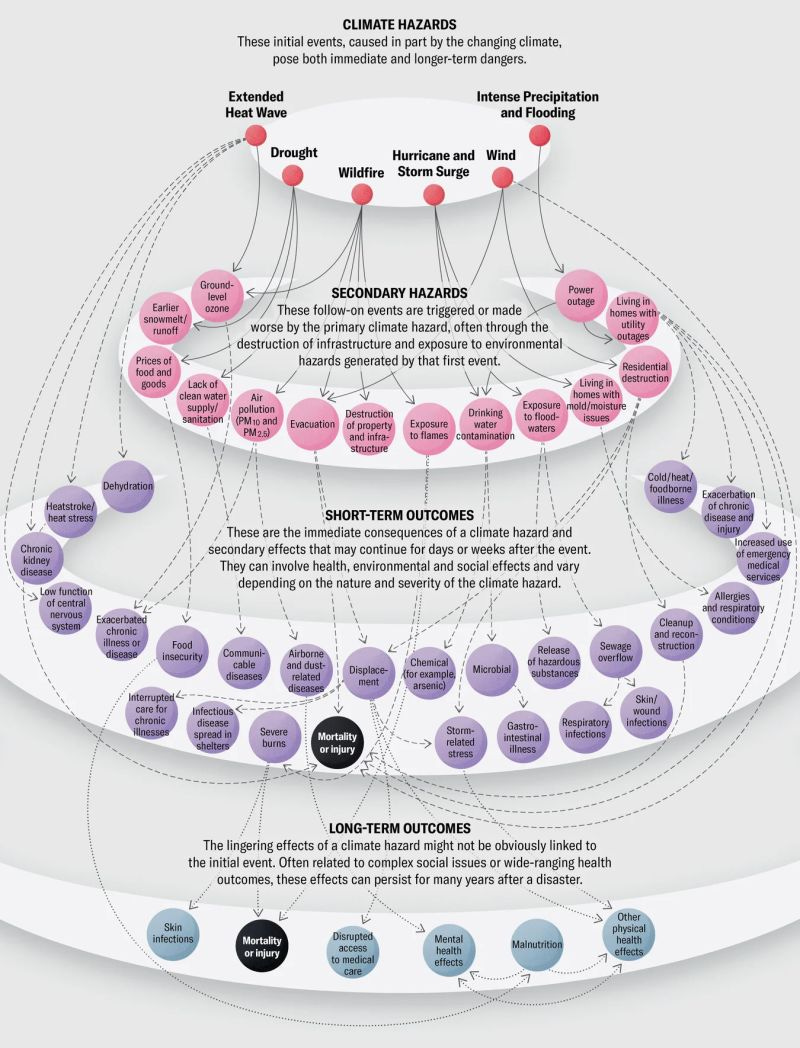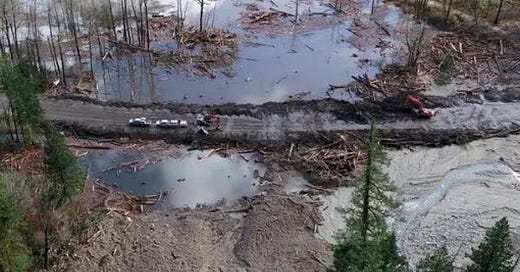Scary Times Produce Scary Decisions
None of us make our best decisions when we’re in a state of panic. And the worst way to respond to climate change is to assume there’s nothing we can do to slow it down.
When the going gets tough and the tough get scared, some mighty strange and dangerous lines of thought start to take root.
That’s the best explanation I can come up with for some of the desperate analysis and deeply flawed arguments we’ve been seeing on the risks and harms we face in a climate emergency and what to do about them.
The problem showed up a couple of weeks ago in an early August op ed in the Globe and Mail, with Blair Feltmate and Anabela Bonada of the University of Waterloo’s Intact Centre for Climate Adaptation urging governments to divert funding from emission reduction efforts to climate change adaptation.
A 22:1 ratio between federal support for mitigation and adaptation “explains why funding for adaptation to counter extreme weather is in short supply,” they wrote. “Canada must readjust climate financing to make funding for adaptation and mitigation more equitable.”
Pointing to another moment where a panic reaction to climate change is pulling solutions in the wrong direction, physicist M.V. Ramana talked about the “emergency framing” that has the federal government and some provinces looking past the financial, environmental, and safety risks of expanded nuclear development.
“About 20 or 30 years ago, if someone had talked about nuclear energy as an environmentally friendly, clean technology, they probably would have been laughed out of the room,” Ramana told guest columnist Susan O’Donnell on The Weekender. But in an emergency framing that casts climate change as the “overwhelming problem,” he added, “we are asked to ignore every other consideration in addressing that.”
It’s a good thing these two snapshots aren’t the only climate and energy news crossing anyone’s desks. Together, they paint a picture of a pundit class that is giving up on emission reductions and grasping at straws for climate solutions when neither of those reactions is justified by the facts on the ground.
Giving In to ‘Realpolitik’
The last-ditch desperation behind the Globe op ed came through loud and clear when Feltmate sat down for a follow-up interview with The Energy Mix.
“The reality is that we’re screwed,” he said. “There is no turning back, in my opinion. We’ve had it. All we’re doing now is damage control….lessening the damage. Because climate change is irreversible. The question is how much we can slow it down from business as usual.”
That deep belief in inevitable loss was bolstered by Feltmate’s sense of the prospects for climate program funding of any kind.
“In a perfect world, I would be quite happy if someone showed up with another giant pocketful of money,” he said. But “with the debt loads governments are carrying, it’s not going to happen, and by the way, I’m not guessing.”
In recent meetings with key deputy ministers, “I was told categorically that if anybody walks through their door with an ask that has a dollar sign attached to it, the answer is no, despite the return on investment,” he recalled. “Because their marching orders are to reduce spending by 10 or 15%, period. So that’s where we are.”
Through that lens, Feltmate concluded, the “realpolitik” of the moment means looking back to a disastrous decade of climate policy (my adjective, not his) under former prime minister Stephen Harper for hints at the funding arguments that will carry any weight after next year’s federal election.
“They didn’t like discussions about climate change,” he recalled. “However, they did not want to see communities and homes flooded out. They did not want to see communities and homes burned down, and they did not want to see people unduly suffering due to extreme heat and potentially dying in extreme heat waves.”
So even if a future government is unwilling to follow the science and connect those risks back to climate change, “they can directly observe that these events are happening with greater frequency and intensity, and with more dire outcomes, and we should hopefully realize support to try to alleviate the amount of stress and cost in the system.”
There are two fatal flaws in this line of argument.
No Adaption Without Emission Reductions
The first is that there’s no realistic way to adapt to the cascading climate impacts ahead if we don’t start drastically reducing emissions now, whether or not political operators of a certain ideological persuasion want to hear about it.
The dire impacts to which Feltmate is reacting are coming at us with average global warming in the range of 1.4 or 1.5°C above pre-industrial levels, with Canada warming somewhat faster and the Arctic heating up at twice or three times the global average. Most optimistic projections still show the Earth on track for more than 2°C unless governments, corporations, and investors get serious about their emission reduction pledges, then take them a giant step further.
That means climate change mitigation—the process of driving down emissions, first and foremost by phasing fossil fuel production down and out—is the new adaptation. Same as it ever was. Particularly for the communities and regions of the world that are most vulnerable to climate change and have the least financial capacity to prepare or respond.
“Canada has warmed about 1.7°C on average in the past century, and what we’re seeing in terms of the destruction from extreme weather events and disasters indicates that we’re not prepared for this level of warming, let alone a higher global rise in temperature,” Ryan Ness, director of adaptation research at the Canadian Climate Institute, said in an email.
So “choosing between adaptation to climate change or mitigation of emissions is a false choice—at this point, we need to do both,” Ness added. “Reducing emissions as swiftly as possible will help blunt the worst effects of climate change down the road, and investing in adaptation now will help to keep communities and people safe while reducing the economic drag of climate change.”
Don’t Give Up on the Cusp of Success
There’s also decent evidence that this is precisely the wrong time to give up on the ambitious, accelerating action we need to get climate change under control.
In recent months, we’ve seen persistent, green shoots of optimism that oil and gas production are set to peak this decade, solar and wind have begun pushing fossil fuels off the grid, and China’s world-leading emissions could begin to fall this year before going into structural decline.
These and other findings had one U.S. atmospheric chemist urging her colleagues not to give up when they’re on the cusp of success.
“You can’t look at the [plummeting] price of solar energy and batteries and not see big change coming,” MIT Professor Dr. Susan Solomon told The (UK) Observer. While some scientists are convinced average global warming is on its way past a devastating threshold of 3°C, that future “is very hard for me to see, because it’s pretty clear that the Paris agreement has already put us on a trajectory that won’t exceed that. Can we stay within 2°C, given how the prices of clean energy have come down? Personally, I think we can.”
There’s also some suggestion from climate science that decisive action on climate change would stabilize global temperatures over a span of three or four years, rather than three or four decades—but only if countries swiftly brought greenhouse gas emissions to zero.
Choose Science, Stay Calm, and Get On With It
In the end, the arguments back and forth leave us in a familiar place.
With the bad news and the good both intensifying, as we’ve always known they would, there’s no such thing as a guaranteed outcome on climate change.
The last chapters of the story still haven’t been written.
We still have the power to write them.
And the only way we’re sure to lose this battle of our lifetimes is if we convince ourselves—or, in this moment, if we allow the Intact Centre, the nuclear lobby, and a likely new government in Ottawa to convince us—that we’ve already lost.
The realpolitik might show no obvious path to the funding, policy, or political support we’ll need to get the job done. But the science tells us that accepting that analysis is tantamount to giving up all hope, as Feltmate acknowledges. And anytime we face a choice between realpolitik and science, the science has to win out.
What no one can afford, and none of us should be willing to accept, is policy or funding decisions driven by panic, however understandable that panic might be. None of us make our best choices or decisions when we’re reacting to an emergent threat. When the only motivation left to us is to avert immediate loss and pain, rather than looking for more durable, longer-term gain.
But it’s also precisely the wrong way to respond to the climate crisis. Particularly in a moment when years and decades of effort to get a rolling, global emergency under control might finally be turning the corner.
Mitchell Beer traces his background in renewable energy and energy efficiency back to 1977, in climate change to 1997. Now he and the rest of the Energy Mix team scan 1,200 news headlines a week to pull together The Energy Mix, The Energy Mix Weekender, and our weekly feature digests, Cities & Communities and Heat & Power.
Chart of the Week

Parks Canada Counters Smith’s Teary Claim on Jasper Wildfire Response
SBTi Declares Carbon Credits ‘Ineffective’ in Sweeping Review
Ontario’s ‘Clean Energy Superpower’ Plan Puts Nuclear Ahead of Least-Cost Options, Analysts Warn
Drought Costs U.S. Hydropower Billions While Increasing Emissions, Study Finds
Sask. Government, Local Oil Company Train High School Students for Disappearing Jobs
Colorado Clean Heat Plan Shows How a Gas Supplier Can Decarbonize
Divert Dollars from Emission Cuts to Climate Preparedness, Adaptation Expert Says
Wildfires foreshadow the looming crisis of internal displacement (Globe and Mail)
How extreme weather affects food prices in Canada (Canadian Broadcasting Corporation)
How Minnesota is winning – and Alberta is losing – the competition for clean power cash (Globe and Mail)
Wary of Trump and Azerbaijan, businesses shun COP climate talks (Politico)
Politicians don’t get how popular climate action is. That’s a problem. (Grist)
‘Exceptionally dangerous’ wildfire with 80-foot flames rages around Athens (Washington Post)
How a warmer climate is changing gender roles (CNN)
For 3 Outage-Prone Tribes, 3 Nested Microgrids Spanning 26 Miles (Microgrid Knowledge)
Here Are Some Reasons to Be Optimistic About the Wind Industry (Bloomberg)
One of Australia’s oldest wind farms could nearly double capacity by ‘repowering’ with bigger turbines (RenewEconomy)
Solar energy breakthrough could reduce need for solar farms (University of Oxford)
SickKids Hospital seeing more kids injured by e-scooters (Canadian Broadcasting Corporation)








It makes sense that an adaptation expert would push for more investment in adaptation. Also, adaptation is an easy sell as the western world starts experiencing first hand accelerating climate disasters. However, it is usually smarter to tackle the underlying problem rather than just consequences. For people who have bought the line that society cannot afford to transition from fossil fuels, then it might make sense to switch investment to adaptation. However, I suspect that messages about giving up on mitigation in favor of adaptation are simply the latest of many fossil fuel industry strategies to deflect blame and slow transition.